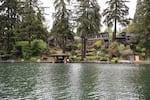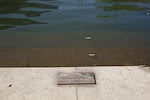A Clackamas County jury has found the city of Lake Oswego was too restrictive in keeping people out of its eponymous lake, which for years has been limited to property owners whose homes surround the water, as well as a seasonal swim park city residents can use.
The general public is not allowed to enter Oswego Lake to swim, fish or boat. Though that could soon change.
The jury’s verdict followed nearly two weeks of testimony. Even though it’s considered advisory, and not binding, Clackamas County Circuit Court Judge Kathie Steele will use the jury’s verdict as a basis for a final written order, likely sometime in May.
It’s the latest development in a case that began in 2012, after kayaker Mark Kramer and open water swimmer Todd Prager challenged the city’s rules in a lawsuit.

Access to Oswego Lake is limited to Lake Oswego residents. There’s a city-owned swim park for residents. All other access is restricted to members of the Lake Oswego Corporation, a nonprofit made up of the roughly 3,500 homeowners who live around and near the lake.
Conrad Wilson / OPB
Friday’s verdict was the second phase of a two-part trial. During the first part in 2022, a judge ruled the waters are subject to the state’s public trust doctrine, meaning the public must have access.
“Oswego Lake consists primarily of title-navigable waters,” the judge stated at the end of the first trial. “Despite that, the lake has been functionally privatized.”
That ruling set the stage for a second trial. This jury focused on the city’s ordinances that prohibited entering the Oswego Lake from three city owned properties: Headlee Walkway, Sundeleaf Plaza and Millennium Park Plaza.
The jury considered factors such as safety, water quality and liability.
Ultimately, jurors determined that the city of Lake Oswego had no reasonable basis for restricting the public from entering the lake at Millennium Park Plaza, where the city had installed metal placards that stated, “Private Lake — Please Stay on the steps.”

Small metal signs adorn steps leading down to Oswego Lake's shore in a public park read: “Private Lake — Please stay on the steps.” Access to Oswego Lake is restricted to city residents only.
Conrad Wilson / OPB
The jury found certain restrictions along Sundeleaf Plaza and Headlee Walkway may be reasonable for restricting access.
Nadia Dahab, an attorney representing Kramer and Prager, said they wanted an advisory jury so that the community could weigh in on the city’s restrictions to the water.
“That voice was consistent with — and affirmed — what the plaintiffs have been saying all along about the importance of public access to public natural resources,” Dahab said in a written statement to OPB. “Much like our beaches, rivers, and other wilderness areas, the government cannot restrict public access without a good reason, and a reason that furthers the purpose of the public trust.”
Attorneys for the city argued the parks along the lake provided the public with “visual access to the lake.” The city said in its legal briefs that it was “objectively reasonable” to prohibit physical entry into the lake because the city designed the parks for “events and gathering spaces.”
Madison Thesing, assistant to the city manager, said the city appreciated “the advisory jury for their service” and that it valued public input in shaping its decisions.
“We understand the jury had to consider difficult questions and their mixed verdict reflects that,” Thesing said.
Attorneys with the Lake Oswego Corporation, which manages the lake, did not return requests for comment.
